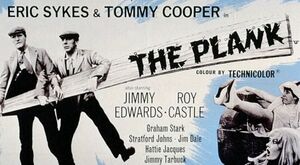The Plank (1967 film): Difference between revisions
(→Cast) |
No edit summary |
||
| Line 1: | Line 1: | ||
{{Infobox film | {{Infobox film | ||
|image = "The Plank" (1967).jpg | |image = "The Plank" (1967).jpg | ||
|caption = | |caption = | ||
| Line 96: | Line 92: | ||
[[Category:Films set in London]] | [[Category:Films set in London]] | ||
[[Category:1960s English-language films]] | [[Category:1960s English-language films]] | ||
Latest revision as of 14:20, 20 February 2023
| The Plank | |
|---|---|
 | |
| Directed by | Eric Sykes |
| Written by | Eric Sykes |
| Produced by | Jon Penington |
| Starring | Eric Sykes Tommy Cooper Jimmy Edwards |
| Cinematography | Arthur Wooster |
| Edited by | John Pomeroy |
| Music by | Brian Fahey |
| Distributed by | Rank Film Distributors (UK) |
Release date |
|
Running time | 51 or 44 minutes |
| Country | United Kingdom |
| Language | English |
The Plank is a 1967 British slapstick comedy film (51 minutes) made by Associated London Films. It follows the misadventures of two builders who require a floorboard. It was written and directed by Eric Sykes, and produced by Jon Penington. The story was based on an episode of Eric Sykes' BBC comedy series Sykes and a... from 1964, called "Sykes and a Plank".
Although not strictly a silent film, it is unusual in having little dialogue; instead, the film is punctuated by grunts, other vocal noises and sound effects.
The cast features many of the top comedians and comic actors of the time.[1]
Plot
After one of the characters uses the last floorboard for heating, the two hapless carpenters have to buy a replacement. They return to the house with the plank on top of a Morris Eight Series E, but the journey is fraught with unexpected difficulties.
The film is a series of "plank jokes" elaborating on the "man with a plank" slapstick routine seen in vaudeville and silent films, and adding new ones. For instance, at one point the plank is tied to the top of the car and projects backward into the open back of a large van. A man (played by Roy Castle) enters the back of the van and sits down. The van drives away, leaving him suspended in mid-air sitting on the end of the plank.
Production
Two variants exist, running for about 51 and 44 minutes respectively. The film was reissued in 1974,[2] with some scenes cut down or extended, and some put in a different order, with the music reapplied to suit; some voices were clarified.
Although a single plank was depicted throughout the film, two planks were actually used for filming: a thin plank for scenes where actors carry the plank, and a thicker plank for scenes where it is being transported on the Morris Eight and for scenes where a thicker stronger plank was required. In December 2011, one of these planks from the film was sold at auction for £1,050.[3][4][5]
Dermot Kelly is often listed as "Concertina Man"[2] or "Affluent Concertina Man",[6] instead of "Milkman". Johnny Speight is often listed as "Chauffeur",[2] "Concertina Man's Chauffeur"[7] or "Concertina Man's Father",[6] instead of "Pipe Smoker in Bus Queue".
Cast
- Eric Sykes as the Smaller Workman
- Tommy Cooper as the Larger Workman
- Dermot Kelly as the Milkman
- Hattie Jacques as the Woman with the Rose
- Roy Castle as the Delivery Man (Smelly Man)
- Jimmy Edwards as the Policeman
- Kenny Lynch as the Dustbin Lorry Driver
- Jim Dale as the House Painter
- Barney Gilbraith as the Paint-covered House Owner
- Rex Garner as the Tourist
- Libby Morris as the Tourist's wife
- Anna Carteret as the 'It's Paint' Woman
- Johnny Speight as the Pipe Smoker in Bus Queue
- Joan Young as the Woman in Bus Queue with Fur Coat
- Dennis Golding as the Boy with Cuffed Ear
- Hyma Beckley as Man in Bus Queue (uncredited)
- Howard Douglas as the Old Man
- Tricia De Dulin as the Young Lady Helped Across the Road
- Thomas Gallagher as the Man with Beer
- Bill Oddie as the Window Cleaner
- Jimmy Tarbuck as the Barman
- Ronnie Brody as the Nude Model Carrier
- Clovissa Newcombe as the Girl in the Van
- Graham Stark as the Amorous Van Driver
- Ian Wilson as the Van Driver's Mate
- John Junkin as the Lorry Driver with the Eye Patch
- Dave Freeman as the UDC Cement Layer
- Stratford Johns as the Station Sergeant
- Oh... and The Cat
See also
- The Plank (1979 film) — a television remake of this film
- Other Eric Sykes short films in a similar style to The Plank:
- Rhubarb (1969)
- Rhubarb Rhubarb (1980, a television remake of Rhubarb)
- It's Your Move (1982)
- Mr. H Is Late (1988)
- The Big Freeze (1993)
References
- ^ "The Plank (1967)"
- ^ a b c Gifford, Denis, ed. (2016). British Film Catalogue: Two Volume Set - The Fiction Film/The Non-Fiction Film. Routledge. pp. 972–. ISBN 978-1-317-74062-9.
- ^ Wilkin, Chris (1 December 2011). "Wooden film star goes under the hammer in Colchester". Daily Gazette. Retrieved 24 April 2021.
- ^ "Plank of wood goes under hammer ... for £1,050". Clacton Gazette. 5 December 2011. Retrieved 24 April 2021.
- ^ "Plank of wood that became a film star is sold for £1k". Daily Gazette. 8 December 2011. Retrieved 24 April 2021.
- ^ a b Peter Cowie; Derek Elley (1977). World Filmography: 1967. Fairleigh Dickinson Univ Press. pp. 202–. ISBN 978-0-498-01565-6.
- ^ "Speight, Johnny (1920-1998)". Retrieved 28 April 2021.